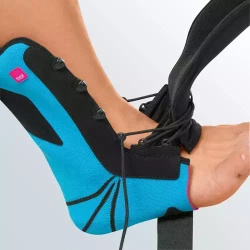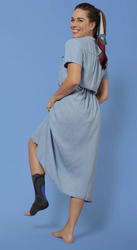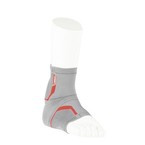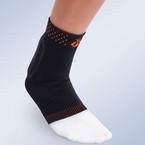Supports and braces for golf
( number of products: 290 )Braces and supports for golfers
Although golf doesn’t exactly seem to be a contact sport, you can still get injured while playing. The most common golf injuries include elbow tendonitis (also known as golfer’s elbow), back strain, ankle or knee pain, rotator cuff tears or any number of wrist injuries. Golf involves a lot of repetitive swinging, constantly bending your back and maintaining a tight grip for hours. By wearing a brace while playing golf, you significantly prevent injuries and add support in order to alleviate pain from various injuries. The most reliable golf brace is one that is light and will not impede your game. Our braces for golfers are ideal for all players - from professional golfers to recreational players looking for a weekend tee time.
Choosing the right golf brace
The most common golf injury is golfer's elbow (medial epicondylitis), which is inflammation of the tendon inside of the elbow. This usually occurs when golfers feel irritation in the arm, but instead of resting, choose to keep on playing, resulting in golfers elbow. To help prevent this condition, athletes turn to golfer’s elbow bands that apply pressure and relieve the tendon of any stress.
Lower back pain is also a common problem among golfers, due to the constant pressure put on the back muscles from swinging. Back supports are becoming more and more popular among golfers as they head out for their 18-holes. Back braces not only provide stability, they also help to prevent back strains throughout a game.
Due to poor form, golfers tend to sustain wrist injuries, which inhibit their game. To help prevent such injuries, a wrist brace is recommended. By wearing one regularly, you reduce the possibility of tendonitis, wrist strains or sprains.
Knee pain can also occur if the muscles surrounding the joint are weak and unable to support you when pivoting and rotating when swinging. By simply having a bad form or muscle imbalance, your ACL or meniscus can be sprained or strained - however, a knee brace can help lower your chance of such injuries.
By far the least common injuries caused by playing golf ten to be those involving the ankles. In most cases, this injury is caused by a misstep. If you have ankle instability, an ankle sleeve or brace would be a viable choice in order to avoid such injuries.
Before playing a game, a warm-up and stretch are vital, as well as icing any irritated joints, muscle or tendons, in order to prevent injuries.

3-fold modular orthosis for functional treatment of ankle joint injuries levamed stabili tri medi

Active stabilisation of the ankle Malleo Sensa 50S5 Ottobock


















